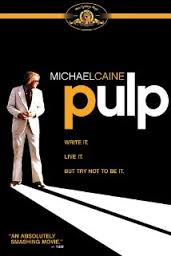
PULP
UK, 1972, 95 minutes, Colour.
Michael Caine, Mickey Rooney, Lionel Stander.. Lizabeth Scott, Nadia Cassini.
Directed by Mike Hodges.
Pulp is not bad at all. It is a thriller as you might expect from Michael Caine and director Mike Hodges (Get Carter), a complicated mystery to unravel. But its tone is what makes it a success. By and large, you should be smiling, even laughing most of the time. It is all tongue in cheek humour, witty, corny, slyly poking fun at the paperback gangster mentality, attitudes and stock situations, verbal and visual gags popping up all the time. The film surprisingly avoids most of the sleaziness and vulgarity of pulp books. Ageing Mickey Rooney, Lizabeth Scott and Dennis Price add to the enjoyment. Not to be taken seriously.
1. How appropriate was the title? As illustrated in the prologue and the credits? The pulp jokes and the type of dialogue during the film? Micky King's pulp commentary during the film? The pulp plot? The irony and laughs for the audience because of the nature of pulp? How successful was pulp as a theme of this murder thriller?
2. What are the qualities of pulp fiction? What are its limitations? How were these used and transformed in this film? Successfully?
3. How attractive were the Maltese locations? The people the tours, the scenery, the background of politics? What exotic flavour did this give to the pulp fiction? How different would the film have been without it?
4. How successful was the film as comedy? The characters and caricatures of pulp-fiction? Goodies and baddies? Villains and murders and twists of plot? The irony in the commentary? The parody of gangster films? The deadpan commentary and remarks of Micky King? The satire on criminals,, gangsters,, police. politics? Farcical laughs?
5. How well did the film utilize the ingredients of a pulp plot? Keeping interest in a central figure, involving the audience, the red herrings on the way, the humorous tone,, the serious implications?
6. What underlying theme was there concerning politics law and order, politicians using issues their ruthlessness. the disillusion of the hero? How seriously was this meant to be taken?
7. How interesting was Micky as a man and as a hero? Michael Caine's deadpan style? Were audiences meant to identify with him? The background of his life as an undertaker, his family, his non-heroism? The quality of his work and the various books? The financial success? The suspicions in his nature involved in this particular escapade? His response to Liz? His reaction to Miller and his death? The encounter with Betty and her style? Taking the job for Preston and writing the book? The involvement with Preston's life and the issues concerning his death? His relationship with Dinuccio? Micky and a succession of disasters? The fact that he did not escape?
8. How enjoyable was Mickey Rooney's performance as Preston? The Hollywood in-jokes,, the parody of Hollywood and the ageing film star, his vanity and self-centredness, the Mafia connections, the wealth and retirement the fame, the jokes about his shortness the parody of the records to be played after his death? How humorous a character? What contribution to the pulp plot?
9. The satire in Dinuccio and the Mafia type henchmen? The parody of gangster language and situations?
10. Liz as a suitable heroine for pulp fiction? Her relationship to the hero, her contribution to the plot?
11. How did Betty fit in as the femme-fatale for a pulp-fiction film? The relationship with Gilbert, the role in politics, wealth and fashion, her attitude towards Micky? At the end?
12. Was Villa a suitable villain? The encounter in the bus and the conversation about pulp? The homosexual overtones? The seeming murder? The surprise of Preston's murder? The final shooting and Miller's death? Was he a good pulp-fiction villain?
13. What did the character of the mysterious English tourist add to the film? Humour at the expense of the English and the Americans? The picture of the tourists, e.g. their bad thoughts?
14. How important were the details of faces for the film, the close-ups, the atmosphere generated?
15. How important were the humorous details of place, e.g. 42nd Street cafe, Ava Maria?
16. How did the film get the most out of the various incidents: the typing pool at the beginning. the nature and parody of the tour, the visit to the ruins with the commentary, Preston's banquet at his death and the parody of Mafia killings, the funeral and the crosscutting, the chase on the beach. the finale of the hunt? What was the irony in the ending with Micky imprisoned. the FBI man false, Betty in control, and the politicians continuing the hunt?